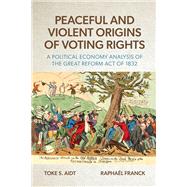
Peaceful and Violent Origins of Voting Rights A Political Economy Analysis of the Great Reform Act of 1832
by Aidt, Toke S.; Franck, RaphaëlBuy New
Rent Textbook
Rent Digital
Used Textbook
We're Sorry
Sold Out
Summary
In Peaceful and Violent Origins of Voting Rights, Toke S. Aidt and Raphaël Franck articulate a new process-based perspective on the study of democratization through a detailed analysis of the Great Reform Act of 1832. Instead of using the historical narrative to provide evidence of a particular theory, the authors use microdata generated by the reform to test competing theories. Aidt and Franck apply their approach to the Reform Bill through econometric analyses that draw on rich micro-political data to show why the reform succeeded despite significant opposition at three different stages: in both the House of Commons and the House of Lords, as well as winning popular support in a general election. While fears of revolution were critical in generating popular support for the Reform Bill in the 1831 General Election, they argue that it was mainly extra-parliamentary agitation from reform societies that helped the bill obtain its one-vote majority in the House of Commons.
By viewing democratic reform as a process rather than as a single event, the authors provide more nuanced answers to what caused the West to extend the franchise. Further, the book presents new insights into the underlying forces of democratisation processes.
Author Biography
Raphaël Franck is Senior Lecturer in the Department of Economics at the Hebrew University of Jerusalem (Israel), as well as a CEPR Research Fellow, a CESIfo Research Associate, and a GLO Fellow. He previously held visiting positions at George Mason University (USA) and at Brown University (USA), where he was a Marie Curie EU Fellow. His primary research interests lie in the areas of political economy and economic growth with regional foci on Western Europe and sub-Saharan Africa from 1800 to the present. His research has appeared in peer-reviewed journals, such as the American Political Science Review, Econometrica, The Economic Journal, The Journal of Monetary Economics, and The Review of Economics and Statistics.
Table of Contents
List of Tables
Preface
Part I: Main Ideas
Chapter 1: Introduction and Overview
Chapter 2: Democratisation and Franchise Extension: The Literature
Part II: Historical Background
Chapter 3: Reform Politics Before 1830
Chapter 4: From the Unreformed Parliament to the Great Reform Act
Part III: A Micro-political Analysis of the Great Reform Act
Chapter 5: The Cliff-hanger: The Vote in the Commons on 22 March 1831
Chapter 6: A Referendum on Reform: The 1831 General Election
Chapter 7: The Battle with the Lords: Voting on Reform in the House of Lords
Chapter 8: Conclusion
Historical Printed Sources
Newspapers
A Note on the Book Cover
Bibliography
Index
An electronic version of this book is available through VitalSource.
This book is viewable on PC, Mac, iPhone, iPad, iPod Touch, and most smartphones.
By purchasing, you will be able to view this book online, as well as download it, for the chosen number of days.
Digital License
You are licensing a digital product for a set duration. Durations are set forth in the product description, with "Lifetime" typically meaning five (5) years of online access and permanent download to a supported device. All licenses are non-transferable.
More details can be found here.
A downloadable version of this book is available through the eCampus Reader or compatible Adobe readers.
Applications are available on iOS, Android, PC, Mac, and Windows Mobile platforms.
Please view the compatibility matrix prior to purchase.
